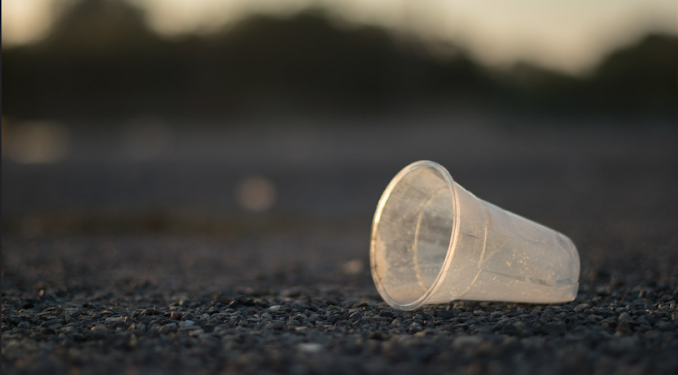On May 10, scientists from the Swiss Federal Institute for Forest, Snow and Landscape Research (WSL) and the Swiss Federal Institute of Technology (ETH) published a study in Frontiers in Microbiology, revealing the existence of microbes that can degrade plastics at 15°C which have the potential to be revolutionary in microbial recycling.
Temperature is a key element that has a large impact on biodegradation rates, but until now, microbial plastic degradation has, for the most part, been studied at temperature above 20°C. The fact that these microbial strains are cold-adapted is significant because less energy is required for the plastic degradation process, so it is more sustainable than previous efforts to break down plastic.
In total, 19 strains of bacteria and 15 strains of fungi were extracted from plastics in areas in the Alps and the Arctic. The scientists allowed the microbes to grow as single strain cultures in the laboratory at 15°C, in darkness, and then they were tested on different types of plastic to identify if they could degrade them.
The plastics experimented on included:
- Non-biodegradable polyethylene (PE): Mainly used in packaging.
- Biodegradable polyester-polyurethane (PUR): Widely used in industrial applications to produce foams, adhesives and coatings.
- Pure polybutylene adipate terephthalate (PBAT): Used in shopping bags, cutlery and mulch film.
- Pure Polylactic acid (PLA): Widely used in biomedical fields, for example, in suture threads, bone fixation screws and devices for drug delivery.
- Two biodegradable mixtures of PBAT and PLA.
Despite the fact that none of the microbes could degrade PE, 19 strains (56%) – including 11 fungi and eight bacteria – were able to break down PUR at 15°C, while 14 fungi and three bacteria were able to degrade the plastic mixtures of PBAT and PLA.
In particular, two fungal strains, Neodevriesia and Lachnellula, were able to degrade all of the biodegradable plastic materials used in the study, which the scientists say could make these strains “especially promising for future applications.”
Many microorganisms have already been discovered that can break down plastics, but they only usually work at high temperatures, which makes the process expensive. The high temperatures required also mean that the use of these microorganisms requires a lot of energy.
Related Articles: Is Recycling as Green as We Think It Is? | Plastic Recycling: Ditch it or Improve it?
There are many global initiatives working to provide new and more effective recycling methods to ensure that plastic does not end up littering natural spaces and polluting the oceans.
Yet, only 9% of plastic waste is currently recycled, while 22% is mismanaged, according to a 2022 report by OECD. The majority of plastic still ends up in landfill.
In addition, current conventional methods of recycling plastic can have “considerable downsides,” the study explains. For example, chemical recycling requires the application of high temperatures and toxic solvents, and mechanical recycling results in a decrease in polymer quality, which means that the plastic cannot be used forever.
However, the new promising approach for recycling biodegradable plastics, under mild conditions, is by depolymerization of polymers using microbial enzymes involved in plastic biodegradation, and that is what this new report on plastic-degrading microbes is focused on.
The Future of Plastic Recycling
It is now widely known that plastic waste is an extremely concerning world issue. For example, plastic debris in the ocean has formed the Great Pacific Garbage Patch, and this debris has had a severe impact on the development of wildlife and marine communities.
In addition to this, plastic pollution has had a detrimental impact on plant growth, and is a threat to crop production and food safety.
139 Mt of #plastics have accumulated in oceans & rivers 🌍🌊
Cleaning up is more difficult & costly every year, as plastics steadily migrate from rivers to oceans & breaks into smaller particles.#PlasticsOutlook 👉 https://t.co/Jrym0V9ttS pic.twitter.com/BJPqvSoIpN
— OECD Environment (@OECD_ENV) February 23, 2022
That is why this new discovery of a potential recycling process that can be enacted in low temperatures is important. As the report states: “microorganisms have a great potential to enable a more sustainable plastic economy by biodegradation and enzymatic recycling of polymers.”
According to The Guardian, Dr Beat Frey, Senior Scientist (Forest Soils and Biogeochemistry) at the Swiss Federal Institute for Forest, Snow and Landscape Research, and one of the study’s authors, explained that:
“The next big challenge will be to identify the plastic-degrading enzymes produced by the microbial strains and to optimise the process to obtain large amounts of proteins. In addition, further modification of the enzymes might be needed to optimise properties such as protein stability.”
With more development, these microbes could revolutionise plastic recycling; reducing the amount of plastic waste that ends up in landfill or in the oceans.
Editor’s Note: The opinions expressed here by the authors are their own, not those of Impakter.com — In the Featured Photo: A clear plastic cup on the ground. Featured Photo Credit: Flickr.










